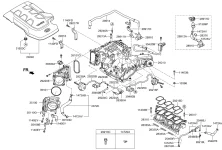DWIL80
Hasn't posted much yet...
- Joined
- Apr 16, 2018
- Messages
- 95
- Reaction score
- 23
- Points
- 8
- Location
- Illinois
- Genesis Model Type
- 2G Genesis Sedan (2015-2016)
I've been researching about GDI engines and came to the conclusion that experts recommend routinely cleaning the intake valves as they will gunk up over time. CRC cleaner seems to be popular and have great results. Anyone here do this yet? I'm at 50k miles so not sure if its a good time to start now.












